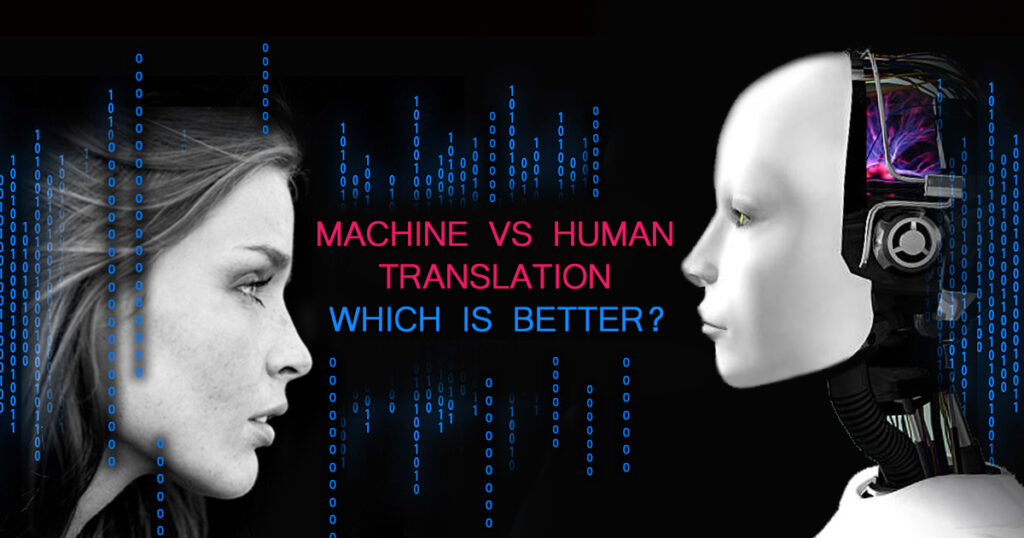Human vs. Machine Translation – Which Is Better?

In the world of translation, the debate between human and machine legal translation has been a topic of discussion for years. While both methods have their pros and cons, the question of which is better remains unanswered. This article aims to explore the differences between human and machine translation and evaluate their respective advantages and disadvantages.
Table of Contents
- Difference Between Human and Machine Translation
- Advantages of Human Translation
- Disadvantages of Human Translation
- Advantages of Machine Translation
- Disadvantages of Machine Translation
- Conclusion
- FAQs
- What is the difference between human and machine translation?
- What are the advantages of human translation?
- What are the disadvantages of human translation?
- What are the advantages of machine translation?
- What are the disadvantages of machine translation?
- How do I choose between human and machine translation?
- Can machine translation replace human translation entirely?
- Are there situations where machine translation is more suitable?
Difference Between Human and Machine Translation
A human translation company in Abu Dhabi is the process of translating written content from one language to another by a professional human translator. The translator reads and interprets the source text and produces an accurate and culturally sensitive translation in the target language. This process involves a high level of linguistic and cultural understanding, as well as creativity and interpretation skills, which are necessary to produce a high-quality translation.
On the other hand, machine translation uses computer software to translate text from one language to another. This technology relies on algorithms that analyze and translate text based on pre-existing rules and language databases. Machine translation has improved significantly over the years, and today’s translation software is capable of producing translations that are relatively accurate and understandable.
Advantages of Human Translation
One of the advantages of human translation is its accuracy and attention to detail. A human translator can understand the nuances of a language and can accurately convey the meaning of a text, taking into account the cultural context and linguistic subtleties. This level of understanding is difficult to achieve with machine translation, which may miss the context and produce an incorrect or incomplete translation.
Another advantage of human translation is its ability to convey the tone and style of the original text. A skilled human translator can recreate the tone and style of the source text in the target language, producing a legal translation near me that reads naturally and is culturally appropriate. Machine translation, on the other hand, may produce translations that sound robotic or unnatural, lacking the emotional and cultural nuances of the source text.
Disadvantages of Human Translation
However, human translation also has some disadvantages. It can be time-consuming and expensive, particularly for long and complex documents. Additionally, the quality of the translation can vary depending on the skill and experience of the translator, which may not be consistent across all translations.
Advantages of Machine Translation
Machine translation, on the other hand, is faster and more cost-effective than human translation. It can process large volumes of text quickly, making it a useful tool for businesses that need to translate a large amount of content regularly. Machine translation can also be useful for getting the gist of a text, particularly when time is of the essence.
Disadvantages of Machine Translation
However, machine translation also has its limitations. It may produce inaccurate translations, particularly when dealing with complex or idiomatic language. Machine translation may also miss the context and produce translation in Abu Dhabi that are grammatically incorrect or awkwardly phrased.
Abu Dhabi, the capital of the United Arab Emirates, is a vibrant and growing city with a diverse population that speaks many different languages. As a result, there is a growing demand for professional translation services in the city.
Many translation companies in Abu Dhabi offer a wide range of translation interpreter services, including legal, technical, medical, and marketing translations. These companies employ highly skilled and experienced translators who are fluent in multiple languages and are familiar with the cultural nuances of the target audience.
The translation companies in Abu Dhabi use advanced technology and quality control measures to ensure that their translations are accurate, timely, and cost-effective. These translation services Riyadh are vital for businesses and individuals who need to communicate effectively with their target audience in Abu Dhabi and the wider UAE region.
Conclusion
In conclusion, both human and machine translation have their advantages and disadvantages. Human translation is more accurate and culturally sensitive, but it can be time-consuming and expensive. Machine translation is faster and more cost-effective, but it may produce inaccurate or unnatural translations. Ultimately, the choice between human and machine translation will depend on the specific needs of the translation project and the resources available to the translator.
FAQs
What is the difference between human and machine translation?
Human translation involves a professional translator translating content manually, considering linguistic nuances and cultural context. Machine translation, on the other hand, utilizes computer software to translate text based on algorithms and pre-existing language databases.
What are the advantages of human translation?
Human translation offers accuracy, attention to detail, and the ability to convey tone and style effectively. Human translators can grasp subtleties that machines might miss, ensuring culturally appropriate and natural-sounding translation services.
What are the disadvantages of human translation?
Human translation can be time-consuming and costly, especially for lengthy documents. Additionally, quality may vary depending on the skill and experience of the translator, leading to inconsistencies in translation quality.
What are the advantages of machine translation?
Machine translation is faster and more cost-effective, making it suitable for processing large volumes of text quickly. It can also provide a general understanding of a text, particularly useful when time is limited.
What are the disadvantages of machine translation?
Machine translation may lack accuracy, especially with complex or idiomatic language. It might produce translations that are grammatically incorrect or awkwardly phrased, lacking the nuanced understanding of human translators.
How do I choose between human and machine translation?
The choice depends on various factors such as the nature of the content, desired accuracy, budget, and time constraints. For critical or culturally sensitive material, human translation is often preferred. For large volumes of content requiring quick turnaround, machine translation may suffice with human review for accuracy.
Can machine translation replace human translation entirely?
While machine translation technology continues to advance, it is unlikely to completely replace human translation, especially for content requiring high accuracy and cultural nuance. Human involvement remains crucial for ensuring quality and preserving the integrity of the message.
Are there situations where machine translation is more suitable?
Machine translation is suitable for situations where speed and cost-efficiency are prioritized over nuanced accuracy, such as translating large volumes of technical documents for internal use or obtaining a basic understanding of foreign language content.









